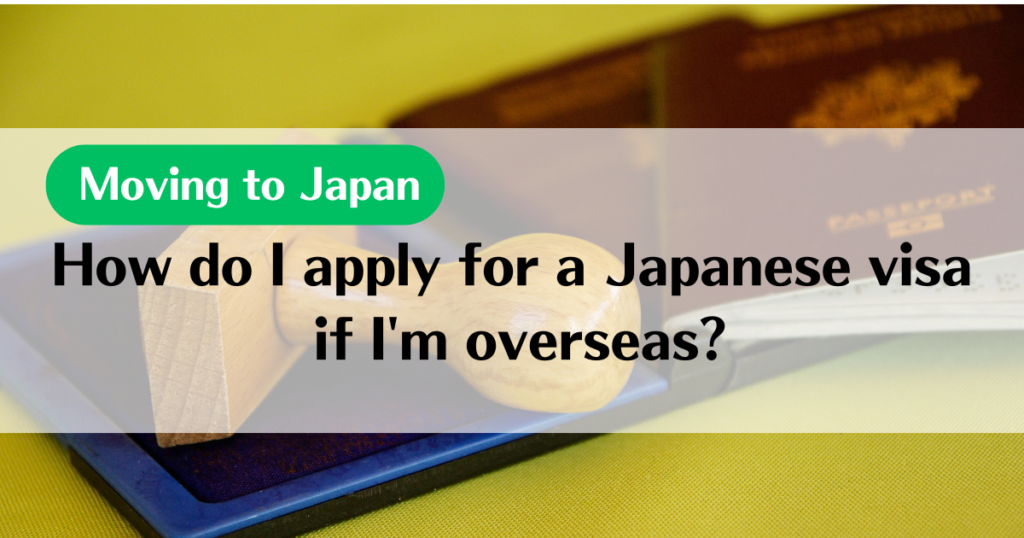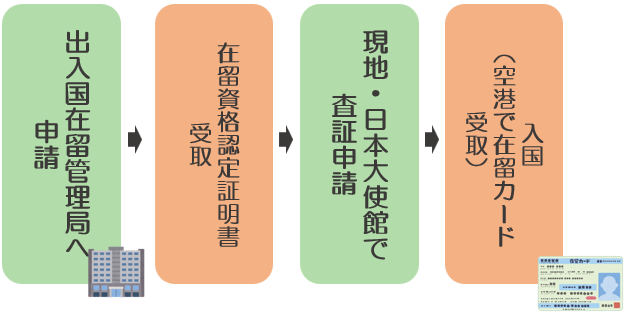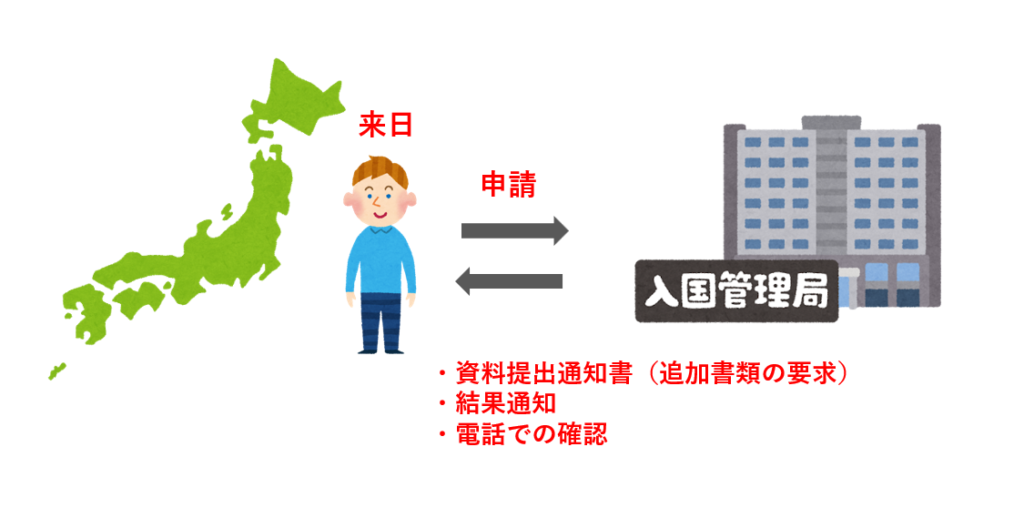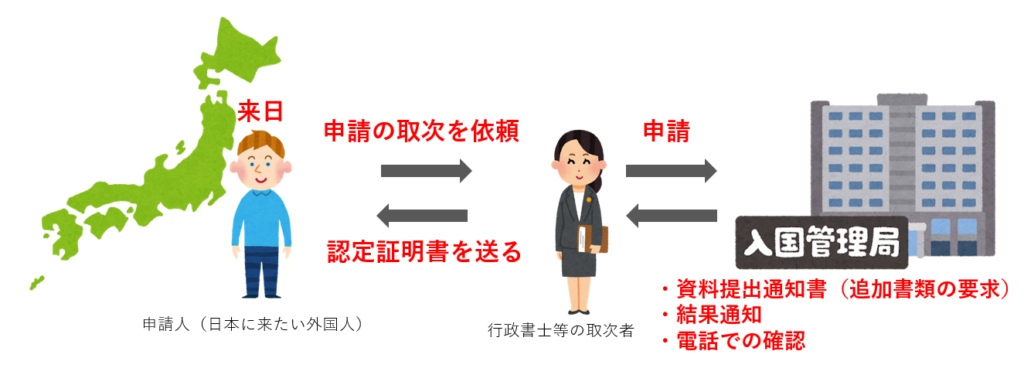
If you are living abroad and want to move to Japan, you will need to go through the residency procedures in Japan, but if you meet the conditions, you can do this without traveling to Japan. We often receive inquiries from former Japanese nationals who wish to return to Japan, or from couples whose primary residence is overseas but who want to relocate to Japan, asking how they can go about the residency procedures. In this article, we will explain the system for residence status procedures, dividing it into cases where you apply on your own and cases where you hire an administrative scrivener or lawyer.
Two application methods
In order to live in Japan, you will need to obtain a visa that matches the purpose and content of your activities. There are two ways to obtain a visa. One is to apply for a Certificate of Eligibility (which is the part of the screening process that is carried out in Japan) in Japan first, and then apply for a visa after receiving the Certificate of Eligibility. The other way is to apply for a visa directly at a Japanese embassy or consulate abroad.
【General】 After applying for a Certificate of Eligibility in Japan, then obtain a visa at a Japanese embassy or consulate overseas.
In order to live in Japan, you need to obtain a status of residence that matches your purpose. The procedure that foreigners who are coming to Japan will need to go through is called “Application for Certificate of Eligibility(在留資格認定証明書交付申請)”. This “Application for Certificate of Eligibility” is handled by the Immigration Services Agency, and if the application is approved, you will be issued a “Certificate of Eligibility”. Once you have been issued a Certificate of Eligibility, you will need to take it to the local Japanese embassy and apply for a visa. In the case of visa applications made while you are in possession of a Certificate of Eligibility, the visa will be issued without any problems (except in some countries) unless there are exceptional circumstances.

Apply for a visa directly at a Japanese embassy overseas.
In fact, you can also apply for a visa directly at the Japanese embassy. At first glance, it may seem easier to apply for a visa directly at the nearest Japanese embassy without going through the procedures in Japan. This is the method used when applying for a short-term visa (tourist visa) or working holiday visa, but it is not actually common except for short-term visas and working holiday visas.
It is generally said that this process takes longer. For example, even if you apply at a local Japanese embassy to have a “Spouse or Child of Japanese National(日本人の配偶者等)” visa issued, the subsequent screening will take place in Japan. Although the Japanese embassy is under the jurisdiction of the Ministry of Foreign Affairs, screening for residence status is carried out by the Ministry of Justice (Immigration Services Agency), so it is said that the process takes longer because it crosses between jurisdictions.
Having already applied for a Certificate of Eligibility, the Japanese embassy will consider the most crucial part of the screening process to have been completed, thereby facilitating a smoother visa issuance.
In addition, some Japanese embassies have rules that do not accept visa applications directly, so even if there are still methods for applying for a visa directly at the embassy (without receiving a certificate of eligibility), it seems that in some cases these methods cannot be used.
While it may seem simple at first glance, this process is actually quite complex. Therefore, the standard procedure is to apply for a Certificate of Eligibility and then obtain a visa.
Rules for applying for a status of residence(visa)
The application for those who wish to come to Japan is called an “Application for a Certificate of Eligibility,” and we will explain who should submit this application and to whom.
Who can make an application?
Generally, when inviting a foreign national from overseas, the application can be made by a Japanese national residing in Japan who is inviting the foreign national, or by a Japanese relative acting as a guarantor. Relatives or representatives go to the Immigration Services Agency with jurisdiction over the place where the applicant plans to reside or the representative’s place of residence. In addition, if the applicant (foreign national) is already in Japan, they can apply for the visa themselves. If the applicant is a child under 16, a legal representative (such as a parent or guardian) can submit the application on their behalf.
On the other hand, the “agent” who submitted the notification can also submit the application on your behalf. Examples of “agents” include administrative scriveners and lawyers.
※You may also consider hiring an administrative scrivener.
Where to apply
Basically, application is made at the Immigration Service Agency that has jurisdiction over the residence of the applicant or the applicant’s representative.
The following are the rules regarding where to apply.
The regional immigration office that has jurisdiction over the place of residence of the applicant or the place of residence of the applicant’s representative
【Application for change of status of residence or application for permission for extension of period of stay(在留資格変更許可申請 or 在留期間更新許可申請)】
Regional immigration office with jurisdiction over the place of residence
| Regional Immigration Office | Area of jurisdiction of the |
|---|---|
| Sapporo Immigration and Residence Office | Hokkaido |
| Sendai Immigration Bureau | Miyagi, Fukushima, Yamagata, Iwate, Akita, Aomori |
| Tokyo Immigration Bureau | Tokyo, Kanagawa Prefecture (Yokohama Branch Office has jurisdiction), Saitama Prefecture, Chiba Prefecture, Ibaraki Prefecture, Tochigi Prefecture, Gunma, Yamanashi, Nagano, Niigata |
| Nagoya Immigration Bureau | Aichi, Mie, Shizuoka, Gifu, Fukui, Toyama, Ishikawa |
| Osaka Immigration Bureau | Osaka, Kyoto, Hyogo (Kobe Branch Office has jurisdiction), Nara, Shiga and Wakayama Prefectures |
| Hiroshima Immigration Bureau | Hiroshima, Yamaguchi, Okayama, Tottori, Shimane |
| Fukuoka Immigration Bureau | Fukuoka, Saga, Nagasaki, Oita, Kumamoto, Kagoshima, Miyazaki Prefectures, Okinawa Prefecture (Naha Branch Office has jurisdiction) |
If there is no branch office nearby, you may apply at the nearest branch or local office. However, depending on the branch office, there may be cases where they do not accept applications for status of residence, so please check with them.
▶ Immigration Services Agency: Jurisdiction
【Case-by-case explanation】 What are the different ways to apply? – Using the example of “Spouse or Child of Japanese National” –
We will explain how to apply for a certificate of eligibility using the example of a “Certificate of Eligibility for Spouse or Child of Japanese National” application. This will be useful for people who are currently not based in Japan, such as former Japanese nationals who want to move back to Japan, or couples who live overseas but want to move to Japan together.
Cases where you do not have an administrative scrivener handle the application (Cases where you make the application yourself)
Applications are made at the Immigration Services Agency in Japan. The main methods are to come to Japan to make the application in person, or to have a relative submit the application on your behalf.
Case 1: The applicant comes to Japan to submit the application in person.
First, there is a method where the applicant (the foreigner who wants to come to Japan) comes to Japan and applies at the Immigration Services Agency. However, it is not necessary to remain in Japan until the results of the application are received. It is possible to return home immediately after applying.
However, depending on the application method, you will receive mail from the Immigration Services Agency (for example, a notice requesting additional documents or a notification of the results), so it is preferable to be able to receive mail. In this case, you may need to make some arrangements, such as asking a relative to receive the mail for you. While online applications are now available, you cannot access the Immigration Services Agency’s online system from overseas. For that reason, you must be physically present in Japan.
If you are coming to Japan to apply yourself, there are two methods: the “Certificate of Eligibility” application method introduced above, and the “Change of Status of Residence” application method, which changes your status from “Temporary Visitor(短期滞在)” to “Spouse or Child of Japanese National”. In principle, you should apply for a “Certificate of Eligibility”. In this case, you can return to your home country without waiting for the result of your application, but if you apply for a change of status from Temporary Visitor to Spouse or Child of Japanese National, you cannot leave Japan until the result is issued.
Incidentally, the screening period can take a long time, from one to six months (or even longer in some cases), depending on the Immigration Services Agency to which you submit your application and the nature of your application. For temporary visitors, the maximum period is 90 days, so you should consider the possibility that you may not receive a response during your stay in Japan when applying.

Case 2: Have a relative in Japan apply on your behalf
It is difficult for the applicant (the foreign national who wants to come to Japan) to come to Japan and make the application in person. Therefore, a relative can act as an agent to make the application to the Immigration Services Agency. In the case of an application for “Spouse or Child of Japanese National”, the Japanese partner or their parents (in the case of an international marriage) or the parents or other relatives (in the case of a former Japanese national) can act as an agent.
In addition to the application process, the role of the representative also includes receiving mail from the Immigration Services Agency (for example, notices requesting the submission of additional documents or results notifications), and in some cases, the Immigration Services Agency will call you, so the representative will need to communicate with them. The results will be sent to the family member who made the application, so he/she will need to forward them to the applicant (the foreign national who wants to come to Japan).

Case 3: Applying for a visa in person at the Japanese embassy
If you do not have any relatives in Japan to rely on and do not want to come to Japan to apply, you may be able to apply for a visa directly at the Japanese embassy. This method is not common, so it is possible that the embassy will not accept your application, depending on your country of origin. Please contact the Japanese embassy where you will be applying for more information about the necessary documents.
When requesting an administrative scrivener to handle the application
Next, we will explain the case of requesting the services of an administrative scrivener or lawyer.
Case 1: The applicant (the foreign national) requests that an agent submit the application on their behalf.
One of the basic rules for applying for a visa is that the applicant must be physically present in Japan. Here, the term “applicant” refers to the foreign national who is seeking to enter Japan, not the agent. If you wish to appoint an agent, such as an administrative scrivener, to act on your behalf, you, the foreign national, will still need to enter Japan. While you will need to be physically present in Japan, you will not need to visit the Immigration Services Agency yourself, as the agent will handle the application process on your behalf.
In this case, in addition to acting as an agent for the application, the agent will also be responsible for receiving mail from the Immigration Services Agency, such as notices requesting additional documents or results notifications. The agent will receive the results of the application and will be responsible for forwarding the Certificate of Eligibility to the applicant, the foreign national wishing to come to Japan.
The main difference from applying in person is that you don’t have to worry about communicating with the Immigration Services Agency or receiving mail. Additionally, in this case, you only need to be in Japan on the day of application and don’t need to stay in Japan while waiting for the results (if you’re applying for a Certificate of Eligibility).

This method is chosen by those who wish to minimize the burden on their relatives.
Case 2: Have the Agent apply on behalf of the Representative
In order for the applicant (the foreign national who wants to come to Japan) to apply without physically being in Japan, they will need to appoint a relative as their representative. As before, in the case of an application for “Spouse or Child of Japanese National,” the Japanese spouse, their parents (in the case of an international marriage), or the parents or family (in the case of a former Japanese national) often act as representatives. The relative, acting as the representative, will sign the application form on behalf of the applicant (if a paper application is required). The signed documents will then be handed over to the agent (administrative scrivener or lawyer), who will physically submit the application to the Immigration Services Agency. In this case, the agent will handle all communication with the Immigration Services Agency and receive any mail, eliminating the need for the applicant to be involved.
It’s important to note that the person signing the application form (the representative or relative) must be physically present in Japan on the date of application. In other words, it’s not enough for the representative or relative to simply be a “Japanese relative”; they must be physically present in Japan on the date of application.
To give a concrete example, if a foreign partner and a Japanese partner are living overseas and apply for “Spouse or Child of Japanese National” status and move to Japan at the same time, the Japanese partner cannot act as the applicant’s representative if they are not in Japan on the day of application. In this case, the Japanese partner’s relative who is currently in Japan will act as the representative and make the application, and this is the case whether or not you use an Agent such as an administrative scrivener or lawyer.

This method relies on the cooperation of relatives without burdening them.
Conclusion
When applying for a Certificate of Eligibility in Japan for a foreign national living overseas, for example, in the case of an application for “Spouse or Child of Japanese National”, the Japanese relative will either act as an agent for the application or the foreign national will come to Japan to apply in person. The foreign national only needs to be in Japan on the day of the application, but this is a necessary condition even if you ask an agent to apply on your behalf. One of the advantages of using an Agent is that you can ask them to act on your behalf (as an Agent) when applying, and they can also act on your behalf when communicating with the Immigration Services Agency afterwards.


